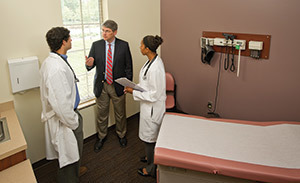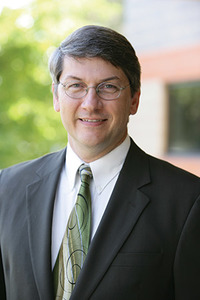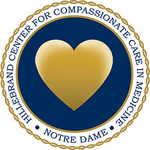
For Ruth Hillebrand, compassionate health care was both a professional and personal mission. A clinical psychologist in Manhattan, she specialized in treating patients with eating disorders. She also had an intimate knowledge of how compassion on the part of a physician could impact a patient’s treatment and recovery. A physician whom she met once delivered her own terminal diagnosis in a brief, perfunctory, late-night phone call and then hung up.
After her experience, Ruth became determined to help other patients avoid devastating experiences like hers. She passed away in 1994 from mesothelioma, a rare form of cancer linked to asbestos exposure. Following her death, her brother, Joseph Hillebrand, a 1943 Notre Dame graduate, established the University’s Ruth M. Hillebrand Center for Compassionate Care in Medicine in 2004. The center’s mission is to advance the scientific theory and practice of compassionate care in medicine and to promote effective communication skills in physicians, nurses, health care executives and managers, and allied health professionals.
The Hillebrand Center fulfills its mission in three ways: undergraduate professional training, research on compassionate care in medicine, and providing training and consultation to health care organizations and individual clinicians.
“We have developed five elective courses for preprofessional students that help to prepare them for health care careers in terms of preparing them for the emotional toll and burnout in the helping professions and to fill in the gaps on skills of relating to patients that medical schools do not have time to train well,” Dominic Vachon, the center’s director and professor of the practice in the Department of Preprofessional Studies, says. “The courses are Medical Counseling Skills and Patient-Centered Medicine, Compassionate Care and the Medical Professions, Spiritualties of Caring in the Helping Professions, Introduction to Personalism in Medicine — the Pathos Project, and Introduction to Hospice and Palliative Care.”
The center also has a research team focusing on the science of compassionate care and communication skills.
 Vachon
Vachon
“We have found that we not only can contribute to the field with our research, but also that the undergraduate students who help do this research are transformed by the research that we do,” Vachon says. “We have just completed the ‘Good Doc–Bad News’ research study in which we did a qualitative study interviewing patients and their loved ones who thought their doctor delivered bad medical news in the best possible manner. There are so many stories of how bad medical news is told to patients poorly.
“We wanted to study examples of exemplary physicians in order to create a positive training tool for medical education. We are currently beginning a study examining the impact of our preprofessional curriculum on later medical training. In several months, we will be doing a study examining what physicians experience as barriers to providing compassionate care to their patients.”
The center has also provided training, consultation and collaborative support to many health care organizations.
“Health care organizations have used us to help with internal projects to promote compassionate care,” Vachon says. This might involve providing continuing medical education talks or workshops; facilitating meetings among health care professionals discussing the most difficult situations they face; doing retreats for nurses; co-sponsoring talks by nationally known experts for the community and Notre Dame; or providing consulting or research support for health care organizations working on internal problems of providing compassionate care or dealing with burnout.”
Vachon notes that undergraduates as well as health professionals have been very receptive to the idea of compassionate care being fully integrated in all aspects of medical care.
“The key to our approach is that we are part of the cutting edge discipline of the science of compassion,” he says. “Compassion and care are often sentimentalized and not rigorously defined or trained. Or compassion is viewed only from a moral or patient satisfaction perspective. We start with what we know about compassion from the perspectives of biology, evolutionary biology, neuroscience, psychology and other social sciences. While everyone likes the idea of compassion in medicine, generally people think of it as an option or that it applies only to certain specialties. But the reality is that if a physician does not integrate compassionate care in his or her medical practice, then he or she is not practicing good medicine. That applies to all specialties including surgery and radiology.”
Undergraduate preprofessional students learn the practical skills of working with patients through innovative programs. The center is part of the Department of Preprofessional Studies and the Center for Health Sciences Advising chaired by Rev. James Foster, C.S.C., M.D., in the College of Science.
“The most popular way is through our Medical Counseling Skills course in which we use standardized patient actors in mock exam rooms covering the kinds of patient situations medical schools do not spend much time on,” Vachon says. “These include how to make very good emotional connections with all patients, how to provide emotional support, how to work with someone who is very sad or very angry, and how to challenge patients to take better care of themselves. In our Introduction to Personalism course, another way we teach good patient relational skills is by teaching them the skills of therapeutic presence or ‘being-with’ patients and we have them practice this in their volunteer work in the community.”
Vachon is a medical psychologist who has spent much of his career training physician residents prior to coming to Notre Dame.

The logo for the Hillebrand Center for Compassionate Care in Medicine is a heart of gold surrounded by the DNA double-helix, representing the increased scientific understanding that compassion is a foundational part of our genetic makeup and integral to being human. It also represents the hope that the source of whatever we do comes from a heart rooted in compassionate caring. It’s an apt symbol of Ruth Hillebrand’s vision of compassionate care in medicine.
“There is great potential to contribute to improving the delivery of health care for patients and to help sustain and inspire the spirit of health care professionals who often become burnt out and want to leave their chosen health professions,” Vachon says. “Our work helps health care professionals know how to be balanced and compassionate in their caring for patients. We help not only those in training who want to learn compassionate care, but also those who have practiced for years and want to restore the compassionate spirit that first led them into their helping professions.”